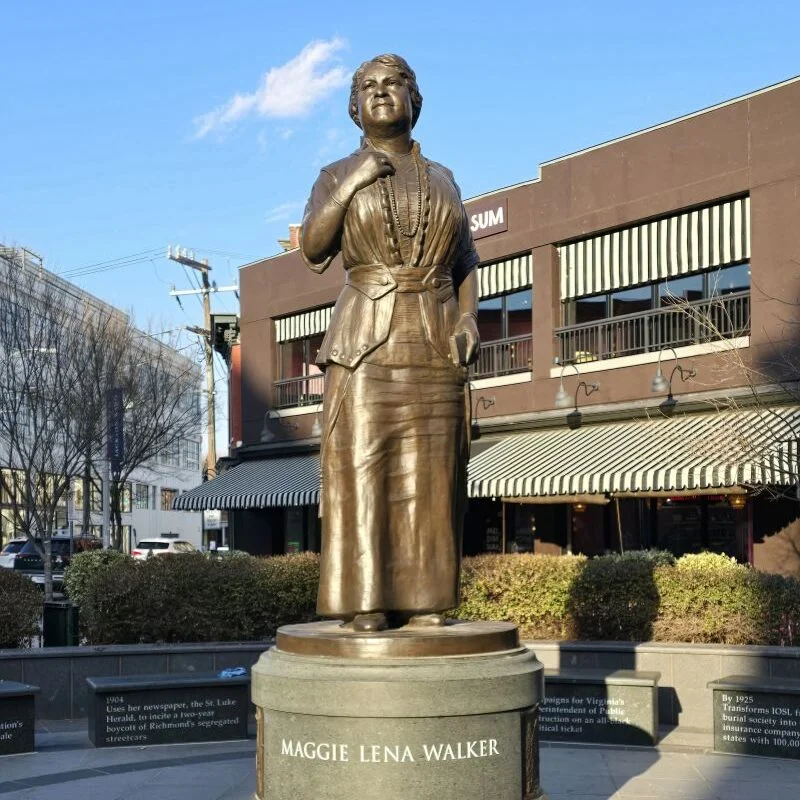
Exclusive networks have long dominated finance, yet African American women in finance have consistently defied barriers to reshape the industry. From founding banks to leading billion-dollar investment firms, their contributions have fostered a more inclusive financial landscape.

Research Strategist
Pioneers like Maggie Lena Walker, the first African American woman to own a U.S. bank, and Madam C.J. Walker, America’s first female self-made millionaire, championed economic independence and wealth-building. Today, leaders like Sheena Allen and Tiffany James continue to drive innovation, advocacy, and investment strategy at the highest levels.
For high-net-worth individuals and family offices, their success offers valuable lessons in wealth creation, investment resilience, and legacy-building. This blog explores their transformative impact and the insights they provide for today’s investors and financial leaders.
II. Breaking Barriers: The Historical Context
The path to financial leadership has never been easy for African American women in finance. Historically, they have faced exclusion from banking institutions, limited access to capital, and systemic racial and gender discrimination. Yet, despite these significant hurdles, many African American women carved out spaces for themselves in the financial industry, creating wealth for their families and strengthening underserved communities. Understanding this historical context provides a deeper appreciation for the resilience and ingenuity that define their legacy.
Systemic Barriers to Wealth and Finance
For decades, African Americans were denied access to traditional banking services, homeownership, and investment opportunities—key pillars of wealth creation. Jim Crow-era policies, redlining, and discriminatory lending practices prevented many from building generational wealth. For African American women, the challenge was even greater. Not only did they face racial barriers, but they also encountered gender biases that restricted their economic mobility and leadership opportunities in the financial services industry.
The absence of financial institutions willing to serve African American communities led many pioneering African American women to establish banks, mutual aid societies, and investment firms. These institutions provided essential financial services and became vital vehicles for community development and economic resilience. Their efforts laid the groundwork for greater financial inclusion and inspired future generations of women in finance to advocate for equity and opportunity.
III. The Pioneer African American Women Who Redefined Finance
While early trailblazers laid the groundwork, a new generation of financial pioneers has expanded their influence—redefining investment management, wealth creation, and leadership. These women have broken barriers and reshaped the financial services industry, demonstrating the power of inclusion, business acumen, and long-term vision. Their contributions continue to inspire generations of women in finance.
1. Maggie Lena Walker – The First African-American Woman Bank Founder
Maggie Lena Walker was a financial visionary who transformed African American economic empowerment through banking. In 1903, she founded St. Luke Penny Savings Bank, becoming the first African American woman in North America to charter and operate a bank.
- Walker’s bank provided African American families and entrepreneurs with access to mortgages, business loans, and savings accounts—financial tools that were largely unavailable to them at the time.
- She promoted cooperative economics, urging depositors to reinvest within the community, which helped stimulate local Black businesses.
- Her leadership extended beyond finance—she was a staunch advocate for economic self-sufficiency, emphasizing financial literacy and wealth preservation.
Today, Walker’s legacy is a testament to the power of institution-building and financial independence, principles that remain central to long-term wealth strategies and community development.
2. Madam C.J. Walker – Entrepreneurial Wealth Creation
Madam C.J. Walker, America’s first self-made female millionaire, revolutionized the concept of financial independence through entrepreneurship.
- After starting with just a $1.25 investment in haircare products for African American women, she built a multi-million-dollar beauty empire in the early 1900s.
- Walker reinvested her wealth into real estate, business expansion, and philanthropy, creating a model for generational wealth-building.
- She employed and trained thousands of African American women, creating economic mobility opportunities long before corporate Diversity & Inclusion initiatives existed.
3. Viola Turner – Redefining Investment Management
In the 1930s, Viola Turner became one of the first African American women in the derivatives industry to manage a million-dollar investment portfolio, breaking into Wall Street when African American investors were virtually nonexistent.
- Turner’s financial acumen allowed her to grow wealth strategically despite racial and gender barriers.
- She became a key financial strategist for one of the largest African American-owned insurance firms, using investment vehicles to expand the company’s influence.
- Her story exemplifies the power of strategic investing and disciplined wealth accumulation.
The Lasting Impact of These Pioneers
These women didn’t just participate in finance—they rewrote the rules. Their influence spans banking, investment management, wealth creation, and entrepreneurship, offering valuable insights for today’s investors.
The financial services industry continues to evolve, but the lessons from these trailblazers remain timeless principles for wealth creation, investment strategy, and economic resilience.
IV. African American Women Leading the Future of Finance
As the financial services industry continues to evolve, African American women are playing an increasingly influential role across private equity, venture capital, wealth management, and fintech. No longer just breaking barriers, they are redefining the financial landscape, driving innovation, and expanding access to capital for underrepresented communities. Their leadership signals a future where finance is more inclusive, strategic, and attuned to global economic shifts.
Private Equity & Venture Capital: Investing in Change
African American women in private equity and venture capital (VC) are making significant investment decisions and shaping the broader investment ecosystem by funding diverse founders and businesses. These women understand that inclusive investing isn’t just about social impact—it’s a key driver of financial returns.
- Kesha Cash – Impact Investing Pioneer
- Kesha Cash is a leading voice in mission-driven venture capital. Her firm invests in businesses that create economic opportunities for underserved communities. She is proving that profit and social impact can go hand in hand.
- Arlan Hamilton – Changing the Face of VC
Hamilton built a multimillion-dollar VC firm from scratch, focusing on funding startups led by women, people of color, and LGBTQ+ entrepreneurs. Her work is a prime example of how diversity in venture capital can unlock untapped economic potential.
These investors are reshaping capital markets by demonstrating the value of underrepresented entrepreneurs and fostering long-term economic resilience.
Wealth Management & Family Offices: Redefining Legacy Planning
The rise of African American women in wealth management and family office advisory is transforming how investors approach legacy planning, investment strategies, and philanthropy.
- Thasunda Brown Duckett – A Leader in Wealth & Retirement Planning
Duckett oversees more than $1.3 trillion in assets. She is one of the most powerful women in the financial services industry. Her leadership emphasizes financial literacy, ensuring that wealth is not just accumulated but sustainably managed across generations. - Lauren Simmons – Wall Street’s Youngest Female Trader
At just 22 years old, Simmons became the youngest female trader at the New York Stock Exchange. Today, she focuses on financial education, using her platform to guide the next generation of investors and wealth builders.
Tech & Financial Innovation: Leading the Fintech Revolution
The fintech sector is one of the fastest-growing areas in finance. African American women are at the forefront of this technological transformation. Through mobile banking, blockchain, and AI-driven investment tools, they are expanding financial access and redefining how money moves in the digital era.
- Sheena Allen – Bridging the Banking Gap
Allen founded a fintech company designed to serve the unbanked and underbanked, particularly in African American communities. Her mission is to close the financial inclusion gap by providing accessible banking services that help individuals build credit and manage their finances. - Tiffany James – Educating the Next Generation of Investors
James is the founder of Modern Black Girl, a fintech education platform that teaches African American women how to navigate the stock market and grow their investment portfolios. Her work addresses the financial literacy gap, empowering more individuals to build long-term wealth through investing.
These women are leveraging technology, data, and financial expertise to create more inclusive financial systems, ensuring that future generations have the tools to invest, build wealth, and access capital on their own terms.
V. Conclusion
African American women in finance are no longer just breaking barriers—they are setting new standards. Their leadership in venture capital, wealth management, and fintech is reshaping investment strategies, expanding access to capital, and driving financial innovation.
Their rise presents a lesson that investing in diverse markets is not only ethical but also financially strategic. Black women-led firms are unlocking high-growth opportunities, proving the value of inclusive investing. Fintech pioneers are transforming capital flows through AI-driven solutions, mobile banking, and digital wealth platforms.
Finally, these trailblazers demonstrate that legacy planning demands forward-thinking leadership, which involves prioritizing sustainable wealth strategies, financial literacy, and community reinvestment. Their contributions ensure that future generations have greater access to financial resources, investment opportunities, and long-term economic resilience.
Legacy planning isn’t just about assets—it’s about vision, stewardship, and impact. If these pioneers have inspired you to think differently about your family’s financial future, explore our Family Office page to learn how we support values-based wealth management.
If you’re looking for more insights, you can explore our full library of articles. Click here for content related to financial planning.
This material is for informational purposes only and does not constitute financial, legal, tax, or investment advice. All opinions, analyses, or strategies discussed are general in nature and may not be appropriate for all individuals or situations. Readers are encouraged to consult their own advisors regarding their specific circumstances. Investments involve risk, including the potential loss of principal, and past performance is not indicative of future results.